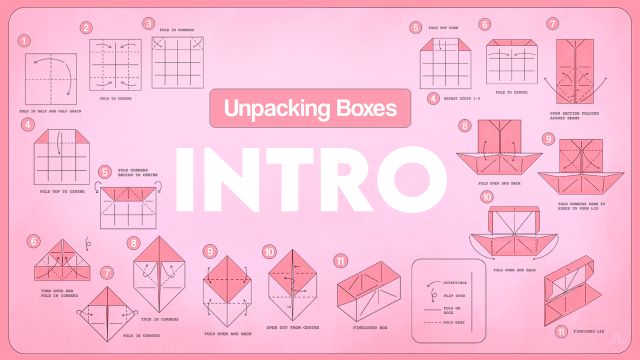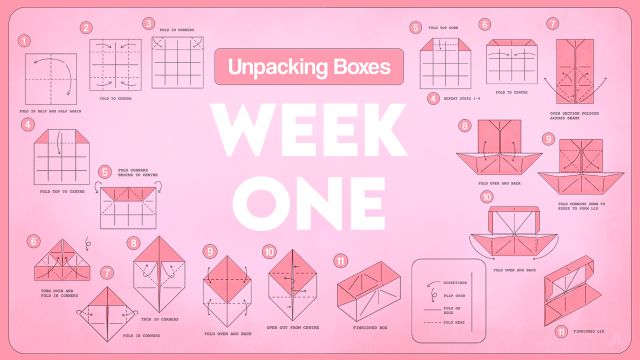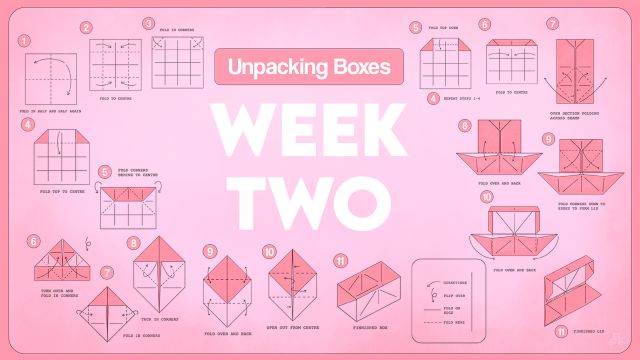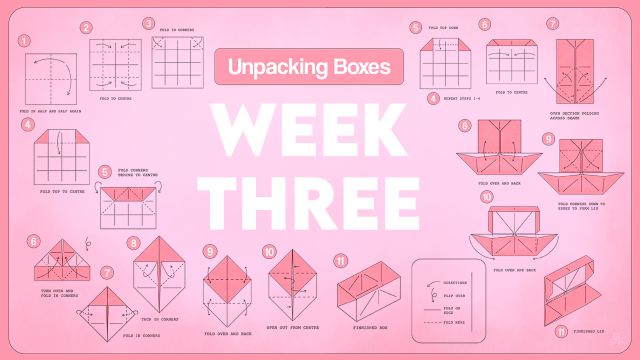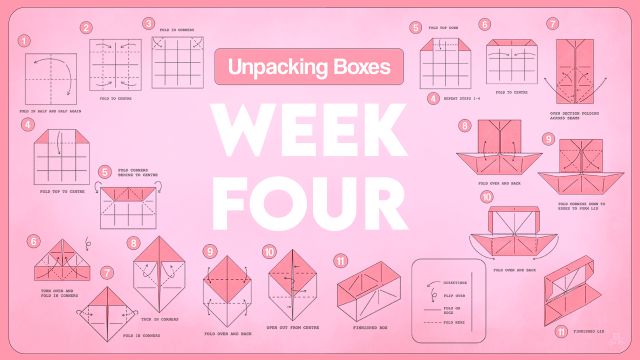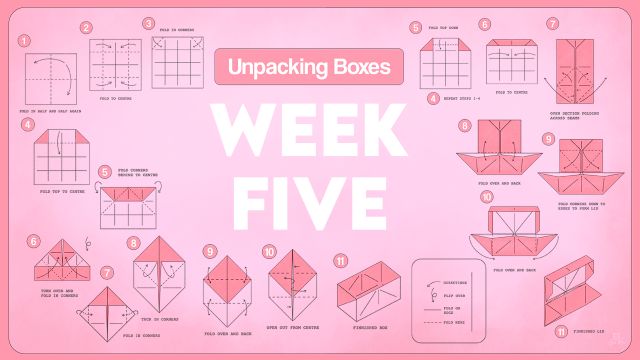Unpacking Boxes - Connect Groups
Introduction
Introduction
 Pack them, stack them, unpack them. Tick them, cross them, leave them blank. Wrap them, post them, play with them. Treasure them, dread them, bury them. Stay inside them, leap out of them, flatten them.
Pack them, stack them, unpack them. Tick them, cross them, leave them blank. Wrap them, post them, play with them. Treasure them, dread them, bury them. Stay inside them, leap out of them, flatten them.
This month join us as we think inside, outside and all around ‘the box’.
After Christmas — perhaps surrounded by packaging and wrapping paper — let’s begin to unpack the idea of boxes. Boxes as repositories for gifts, for memories, for regret, for hopes, for our love...
Find how to get involved: Connect group Blog
Week One
Part 1: Unpacking boxes
 Conversation Starter
Conversation Starter
What is your favourite kind of box? And what is your least favourite kind of box?
Read 1 Samuel 2: 18-21
Hannah makes Samuel a little robe every year, a gift that grows with him. What are the gifts and the hopes we are wrapping up to give to the children in our society? What do we want them to have? How can we make it happen?
Read Colossians 3: 12-17
So, where are your ‘clothes of compassion'? Are they in storage? Are they folded in a box in the back of cupboard covered in mothballs? Are you worried that perhaps they’re no longer in fashion? Or that maybe they won’t fit anymore?
Reflect on your life and contemplate how compassion, kindness, humility, meekness, and patience fit into it. In what way do you ‘wear’ these traits day to day? And if you feel you don’t, how do you think you can rediscover them, and get them out the wardrobe!
Read Luke 11: 5-13
As one year comes to a close and another begins, what are we asking to receive from God?
Week Two
Part 2: Playing with boxes
 Conversation Starter
Conversation Starter
This week we’re using boxes to think about creativity. Are there any boxes in your life that you could turn into something new or use for something new?
Read Jeremiah 31: 7-14
This reading offers a compelling vision of all sorts of people, from all sorts of places, in all sorts of ways coming together. Verse 13 gives a vibrant exuberant picture of worship:
“Then shall the young women rejoice in the dance, and the young men and the old shall be merry.
I will turn their mourning into joy,
I will comfort them, and give them gladness for sorrow.” (NRSVA)
We often use ‘worship’ as a shorthand for church services in general, or singing songs in particular. But there are many ways of worshipping together that don’t involve ‘a church service’. Thinking outside the box, and engaging all our senses, what are some different expressive ways you can offer exuberant worship to God?
Read Psalm 147: 12-20
Just as we play with and rearrange boxes, we can play with language (like the psalmist in verses 15-18 and indeed across the psalms) experimenting with combining different words to learn new things about our God. On your own, or in a group, have a go at writing your own version of verse 15 using different metaphors, similes or imagery.
“He sends his command to the earth; his word runs swiftly.” (NIV)
What’s a different metaphor from running swiftly? What is another way of describing how God’s word comes to earth? Something that resonates with your own experience perhaps.
Read Matthew 2: 1-12
The Wisemen bring a Baby Box with a twist... Scotland now offers every family expecting a newborn a ‘Baby Box’ full of practical things infants need in their first months, additionally the box itself is fitted with a mattress for the baby. But Jesus didn’t have a baby box or health visitors or a national health service.
If you were putting together a baby box for the infant Jesus — what would you put in it?
Week Three
Part 3: Repurposing boxes
 Conversation Starter
Conversation Starter
What boxes in your life can you not live without? And what boxes would you rather live without?
Read Psalm 29
The voice of God cuts through all...
As we’ve explored already this month, boxes can be practical and fun, a useful way of organising our lives, or of being generous, or imaginative... but of course boxes can also be constricting. The voice of The Lord breaks cedars and oak, it can break through the harmful boxes that limit us too.
What helps you to ‘pray outside the box’ to ignore the distractions and tune into the voice of God?
Read Luke 3: 21-22
I love you, I’m proud of you, you’re great... is a message we all want to hear... and can hear echoed at our own baptisms when God claims us as a beloved member of the family.
To keep running with the boxes metaphor, in the light of the loving invitation of baptism what are the important things for us to store in the box of life and what are the things we need to chuck out? What do we prioritise? And what do we leave behind?
Read Luke 12: 22-34
Jesus often invites us to rearrange and reorganise how we see things.
As disciples following the way, loving one another, we are called to share, not to hoard. An anagram of ‘HOARDINGS’ is ‘DO SHARING’.
How does this text challenge how you live your life and the decisions you make today?
Week Four
Part 4: Folding boxes
 Conversation Starter
Conversation Starter
Do words and phrases like ‘flatpack’ or ‘self-assembly’ fill you with excitement or dread? More generally do you enjoy DIY and making things?
Read Isaiah 62: 1-5
From out of the deserted and the desolate God can origami a beautiful crown; the people of God refolded into something new and glorious.
The wonderful thing about origami is that you can make incredible, beautiful shapes without making any cuts to tears.
How might our God of transformation be folding, pleating, creasing and working in your life?
Read 1 Corinthians 12: 1-11
Here’s an idea, do you think God sometimes gives us ‘flatpack gifts’ that require self assembly? And do you think sometimes there are parts intentionally missing... so that we have to find the corresponding parts in gifts given to other people?
Have you ever had the experience of feeling like God has given you a gift that can only be fulfilled through working together with someone else?
Read John 2: 1-11
The old wine boxes are flattened. It’s all run dry. And then suddenly there’s more wine. And it’s not just more wine. It’s the best wine.
Why do you think the wine tasted better? And how would you have felt as a guest at the wedding upon getting your glass topped up?
Week Five
Part 5: Recycling boxes
 Conversation Starter
Conversation Starter
Can you think of an example of something being recycled (or repurposed, reimagined or reclaimed perhaps) in the Bible?
Read 1 Corinthians 12: 12-26
As a church, as a human race, as a planet — we need to be more mindful that we are part of one big system. Have we been guilty of cutting off our hands and feet (see verse 21)?
In our church, in our politics, in our economies where have we been neglecting to value and include people? And given that our theme this week links to the environment, let’s also think especially of the circumstances where our economic choices have had an impact on the security and livelihood of others.
Read 1 Corinthians 12: 27-31
Our strength (as a church, human race, planet) comes from being a complex system. We’re not all the same, we each have different gifts that work together.
’Monoculture’ is a term from agriculture to talk about growing one crop in one place exclusively, with potentially detrimental effects over time to the ground and the larger ecosystem.
Can you think of examples of monoculture in our society and our churches where we have focused too much on cultivating one thing at the expense of others?
Read Luke 4: 14-30
This sequence contains what is sometimes referred to as the ‘Jesus Manifesto’ or the ‘Nazareth Manifesto’.
How does this manifesto inform how we think about ecology, sustainability, and climate justice?




